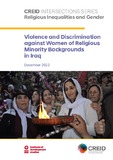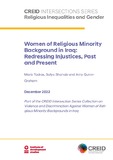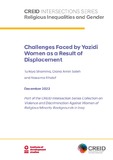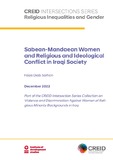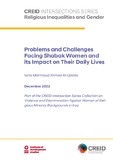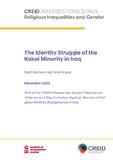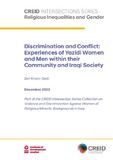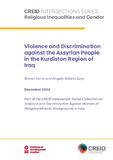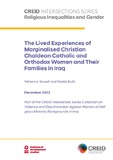| dc.contributor.author | Tadros, Mariz | |
| dc.contributor.author | Shahab, Sofya | |
| dc.contributor.author | Quinn-Graham, Amy | |
| dc.contributor.author | Shammo, Turkiya | |
| dc.contributor.author | Saleh, Diana Amin | |
| dc.contributor.author | Khalaf, Nassima | |
| dc.contributor.author | Al-Qaddo, Syria Mahmoud Ahmad | |
| dc.contributor.author | Sarhan, Faiza Diab | |
| dc.contributor.author | Kakai, Solaf Muhammed Amin | |
| dc.contributor.author | Gedi, Zeri Khairy | |
| dc.contributor.author | Toma, Shivan | |
| dc.contributor.author | Zaya, Angela Odisho | |
| dc.contributor.author | Yousef, Yohanna | |
| dc.contributor.author | Butti, Nadia | |
| dc.date.accessioned | 2022-12-06T13:56:56Z | |
| dc.date.available | 2022-12-06T13:56:56Z | |
| dc.date.issued | 2022-12-06 | |
| dc.identifier.citation | Tadros et al. (2022) Violence and Discrimination Against Women of Religious Minority Backgrounds in Iraq, CREID Intersections Series; Religious Inequalities and Covid-19, Coalition for Religious Equality and Inclusive Development, Brighton: Institute of Development Studies, DOI: 10.19088/CREID.2022.025 | en |
| dc.identifier.uri | https://opendocs.ids.ac.uk/opendocs/handle/20.500.12413/17780 | |
| dc.description.abstract | This volume is part of the Intersections series which explores how the intertwining of gender, religious marginality, socioeconomic exclusion and other factors shape the realities of women and men in contexts where religious inequalities are acute, and freedom of religion or belief is compromised. This volume looks at these intersections in the context of Iraq. Its aim is to amplify the voices of women (and men) whose experiences of religious otherisation have accentuated the impact of the intersections of gender, class, geography and ethnicity. At time of publication, in December 2022, the country is going through a particularly turbulent phase, prompting some to wonder why now? Isn’t it bad timing to focus on the experiences of minorities, let alone inter- and intra-gender dynamics? Iraq is caught in the middle of geo-strategic struggles of tectonic proportions but this is all the more reason to understand the dynamics of micro-politics through a gender-sensitive lens. Doing so sheds light on the interface between global, regional and local power struggles in tangible and concrete ways. | en |
| dc.language.iso | en | en |
| dc.publisher | Institute of Development Studies | en |
| dc.rights.uri | http://creativecommons.org/licenses/by/4.0/ | en |
| dc.title | Violence and Discrimination Against Women of Religious Minority Backgrounds in Iraq | en |
| dc.rights.holder | Institute of Development Studies | en |
| dc.identifier.doi | 10.19088/CREID.2022.025 | |
| dc.identifier.doi | 10.19088/CREID.2022.016 | |
| dc.identifier.doi | 10.19088/CREID.2022.017 | |
| dc.identifier.doi | 10.19088/CREID.2022.018 | |
| dc.identifier.doi | 10.19088/CREID.2022.019 | |
| dc.identifier.doi | 10.19088/CREID.2022.020 | |
| dc.identifier.doi | 10.19088/CREID.2022.021 | |
| dc.identifier.doi | 10.19088/CREID.2022.022 | |
| dc.identifier.doi | 10.19088/CREID.2022.023 | |
| rioxxterms.funder | Department for International Development, UK Government | en |
| rioxxterms.identifier.project | Coalition for Religious Equality and Inclusive Development (CREID) | en |
| rioxxterms.version | VoR | en |
| rioxxterms.versionofrecord | 10.19088/CREID.2022.025 | en |
| rioxxterms.funder.project | 7a473ec6-92f8-49ff-98df-9ec27d8d5fe6 | en |

